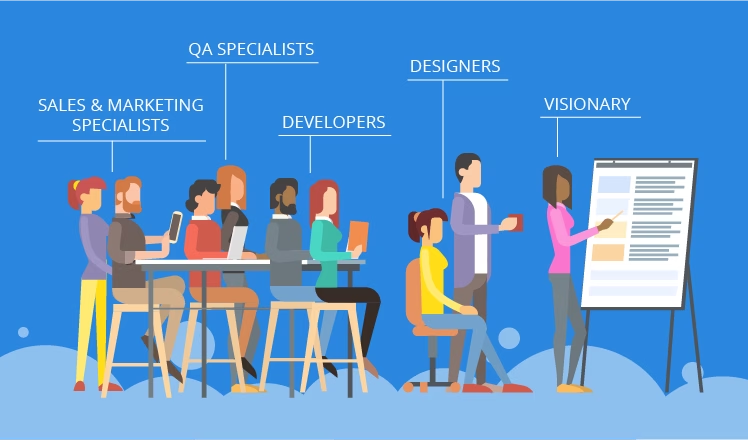- Developers
- Developer Blog
- Software Development
- Dedicated vs Freelance Software Development Teams: A Review

profile

By Aran Davies
Verified Expert
9 years of experience
Aran Davies is a full-stack software development engineer and tech writer with experience in Web and Mobile technologies. He is a tech nomad and has seen it all.
Welcome to this article on freelance software development teams vs dedicated development teams. Here you’ll find useful tips on how to choose between freelancers and dedicated developers.
In this article
- Why do organizations need to choose between dedicated and freelance development teams?
- How to choose between dedicated vs freelance software development teams?
- Why hiring from freelance platforms like Upwork and LinkedIn can take time
- Other things to consider when choosing between freelance software development teams and dedicated programmers
- Frequently Asked Questions on dedicated vs freelance software development teams
Using the services of freelance software developers vs dedicated development teams is a very interesting subject that needs to be explored.
Software development is difficult at the best of times, this is exactly why you need the top tech talent behind you to ensure your software project is a success. Before you hire remote software developers, you will need to decide whether to hire software developers from dedicated platforms or hire freelance developers.
Why do organizations need to choose between dedicated and freelance development teams?

To start this review article on freelance software development vs dedicated development teams, we need to begin by remembering that software development is only one part of an organization’s IT budget. Infrastructure, software, emerging technology, etc. are the other parts of this budget.
A recent report from Statista states that the global IT services market will grow from $1,512 billion in 2025 to $1,879 billion in 2029. The “IT Industry Outlook” published by CompTIA states that the IT and business services component forms 20% of the IT market.
What is the budgetary outlook for these different parts? A comprehensive research report shows that most organizations are increasing their IT budgets, however, IT infrastructure including hardware and cloud accounts take most of this increase. In other words, the software development budget may see no noticeable growth!
What does this mean for you as an entrepreneur or a software development manager in an enterprise? It means that you will need to spend your software development budget very judiciously. You need value for money, therefore, you must find the best software developers within your budget!
You probably have a bare-bones application maintenance team, if you haven’t outsourced it entirely already. This is a wise decision as remote workers allow access to the best and brightest from all over the world.
However, you need to choose between an expert dedicated team and a freelance team. Both have their pros and cons, read on to find out which is the best for you.
How to choose between dedicated vs freelance software development teams?

How do you, as an entrepreneur or a development manager, decide between a freelance software development team vs. an expert software development team? This involves careful decision-making, where the following factors come into play:
1. The project manager
Do you have a competent project manager (PM) for the project you are planning? Or, are you sourcing the project manager from an external agency? This is the most important factor in this analysis.
A competent PM is the most critical success factor for a project. I explained why in “10 biggest challenges when developing an app“. In today’s complex environment, a project manager needs to play the role of a systems integrator to perfection.
When you build a development team by hiring freelance software engineers from the remote market, the PM will need to integrate the work from a diverse set of people. That’s possible only if the PM fully aligns with the mission, vision, strategy, and standards of your project and organization.
If you are sourcing the PM from the freelancer market, this alignment will be sub-optimal. You will expose the project to a high-severity risk if you expect this PM to be able to easily integrate work from freelance developers whose past experience and skill set are a big unknown.

Get a complimentary discovery call and a free ballpark estimate for your project
Trusted by 100x of startups and companies like
You should consider freelance software developers only if you can fully dedicate a highly competent PM in your organization to managing them carefully.
On the other hand, if you can’t allocate a competent PM for the project, then you should ask for an expert development team from a reputed software development company, which provides a qualified PM as part of their service. The PM should use modern PM techniques and processes to manage the project end-to-end.
2. The complexity of a project
The complexity of your project is another key factor in choosing between freelance software engineers and expert teams. Determining the complexity of the project requires a meticulous analysis, involving several questions and factors, e.g.:
- A strategic project tends to be more complex than other projects. Read “Using project complexity determinations to establish required levels of project rigor” for insights into this.
- Is this a “First of a kind” (FOAK) project? While answering this question, consider the target geography for the software. A project may not be FOAK in a matured market, however, it could be a novel one in an emerging market.
- How large is the target user base of the application? A larger user base often imposes higher scalability requirements, in addition to other complexities.
- The number of key functionalities influences project complexity. At the same time, exacting “Non-Functional Requirements” (NFRs) like high uptime can make a project more complex.
- What kind of user interface will you require? The OS platform will also influence the UI designer you hire.
- Projects with higher estimated costs and longer estimated schedules will likely be more complex.
- Whether you are creating a “System of Record” (SoR) such as a core functional application, or a “System of Engagement” (SoE) like a mobile app, has an enormous bearing on project complexity.
- Are the project requirements clear and well-documented? Do you have an unambiguous sign-off from the business stakeholders on the requirements? Sketchy and uncertain requirements without a sign-off from the customer indicate a project with a possibly higher degree of complexity. Read “Project management 101 – how to profile project complexity” for more information on this.
- Are you targeting audiences across multiple geographical regions, e.g., North America, Europe, Asia Pacific, etc. with your planned application? That could mean a complex project.
- Will the project use relatively new technologies such as “Artificial Intelligence” (AI), “Machine Learning” (ML), “The Internet of Things” (IoT), blockchain, etc.? These are niche technologies, and projects using them tend to be more complex.
- Does the project have a high-risk profile?
Note that this is not an exhaustive list of questions and factors. You can read “Measuring the project management complexity: The case of information technology projects” for more insights.
If you determine the project to be complex, then a freelance software development team will increase the complexity. A dedicated team will be a better bet for you in such cases.
3. The requirement for industry knowledge in the project
Projects vary widely due to many factors, one of which is the requirement for industry knowledge in the project. By their very nature, software development for certain industries requires more industry knowledge.
This Quora Q&A thread elaborates on the importance of this.
An example is the healthcare industry, where stringent regulatory requirements apply. Regulations like the “Health Insurance Portability and Accountability Act” (HIPAA) are complex, and software development for core functionalities requires considerable industry knowledge.
Another example is the financial services industry, where payment providers need to comply with regulations like the “Payment Card Industry Data Security Standard” (PCI DSS). Developers need a degree of industry knowledge in such cases.
It’s quite hard to find the required number of quality freelancers with the appropriate industry domain knowledge.
On the other hand, software development companies provide expert development teams, and these companies invest in building vertical industry knowledge and only assign software developers with experience in that industry.
4. The SDLC model for the project
Your choice of the “Software Development Life Cycle” (SDLC) model influences your decision about what kind of team you use. Take the example of the “Agile” SDLC model. Agile philosophy stresses software developers working closely with customers, which improves the focus on real business value.
Agile projects usually start with partly-defined requirements so the team will quickly develop a product for these initial requirements. Feedback provided by customers will then further firm up the requirements, and the team will enhance the product in quick iterations to meet these.
Read more about Agile in “What is software development life cycle and what you plan for?”.
You can see why software developers need to collaborate closely with the customer. In fact, in the Scrum methodology, i.e., a popular technique for Agile development, engineers work in small closely-knit cross-functional teams. Developers and testers work together in these “Scrum teams” along with customers.
Many organizations actually prefer such teams for better collaboration. You can read more about such teams in “How to build a Scrum development team?”.
Implementing this kind of close collaboration in closely-knit teams requires expert development teams since it’s too hard to build such teams with inexperienced freelance software engineers.
5. The level of technical expertise needed in the project
Some projects require medium-level technical expertise on the part of programmers, however, some other projects need a high degree of technical knowledge.
The difference between an excellent software developer and a good software developer is usually the advancement provided by an attitude that is focused on continuous learning vs. one that is focused purely on getting the job done so that they can go home.
Technology evolves rapidly, therefore, programmers need to continuously invest in learning. That’s not easy since it requires a structured and systematic approach to learning. Read more about it in “How to keep up to date as a software developer”.
When you hire a freelance software developer, you don’t quite know if they continuously invest in self-development and learning. However, reputed software development companies need to stay ahead of the competition in the market and have the best tech talent. Therefore, the best software development companies focus on the following:
- Systems thinking, where people consider organizations as complex systems;
- Personal mastery, which helps people to be in a constant state of learning;
- Infusing new ideas and changes;
- Creating a shared vision;
- Team members who are thinking and learning together.
Successful software engineering companies are “learning organizations”. You can read more about this in “Leadership and the learning organization”.
6. The quality management system in the project
A successful project requires much more than just technical knowledge, tools, platforms, and frameworks. You might be able to hire freelancers with the required programming language skills and familiarity with the required platforms/tools, etc.
However, the successful execution of any project requires implementing the right quality management system and adhering to it. Read “Importance of quality management” for more insights into this.
Now, it’s often hard to find freelancers with the requisite expertise in quality management.
Reputed software development companies have an advantage here since they proactively invest in implementing comprehensive quality management systems. Many even develop their own PM tools based on their past project management data.
7. Usage of DevOps and “Continuous Integration” (CI)
If you are planning an Agile project, then you are likely planning for frequent releases, e.g., a release every two weeks. Naturally, you will implement DevOps processes, methods, and tools (PM&T) into the project for this.
“Continuous Integration” (CI) assumes importance here since this encompasses continuously analyzing, building, testing, and deploying software. You need to build a CI environment for this, however, that’s easier said than done.
Building a CI environment involves several challenges, and you can read more about them in “Top 10 CI/CD Pipeline Implementation Challenges And Solutions”. Here, I focus on a key challenge, and that is the lack of coordination between CI and “Continuous Delivery” (CD).
You will want CI to feed CD. This requires that you build a CI pipeline and full CD system, however, this needs much more than just tools like Jenkins. Software developers, testers, DevOps engineers, and scrum masters should all work together, and contribute to building this environment.
Hire expert developers for your next project
1,200 top developers
us since 2016
This involves a significant degree of collaboration, and that too, in a sustained manner. Read more about this in “5 common pitfalls of CI/CD—and how to avoid them”.
When you hire individuals accustomed to freelance work, you will find it really hard to enable this collaboration. You need an expert team led by a PM with the required emotional intelligence to facilitate such collaboration.
8. Managing the project delivery risks
How you plan to mitigate and manage the project delivery risks influences your decision to hire freelance software engineers or a field expert development team. For example, you might need to mitigate and manage the following risks:
- If your project involves niche skills, the hiring lead time could be high.
- Developers could take unplanned time off, which could impact the project schedule.
- The project might require implementing complex architectural patterns like microservices patterns, and a competent software architect may not be readily available.
In addition to this, many project managers managing freelance software development teams experience problems doing so because of time zone differences.
Should your freelancers just be located on the East Coast of the United States and Central Europe, for example, this represents a full 9-hour difference or a full working day.
So, should a project manager requires two members of the team to be working at once, they will certainly encounter problems.
In the case where an issue is deemed urgent enough to try to press the two to work, it can often lead to discontent from one, if not all the freelancers, as well as leading to mistakes through tiredness.
Freelancers are also expected to manage their own time meaning that they may take days off or be committed to working on other projects when your project manager needs them. When you throw in a freelancer project manager to this mix as well, the results can be disastrous.
This is not an exhaustive list, and you can refer to “Types of risks in software projects” for more examples. The key question is whether you are equipped to manage these and other risks.
If you are not, then freelancers won’t suit your project requirements, and you need a field expert development team.
Why hiring from freelance platforms like Upwork and LinkedIn can take time
Very often, startups feel tempted to hire freelancers at a low hourly rate. Generally speaking, one advantage freelancers hold over other hiring avenues is that they are often cheaper. The hiring process can be complex though. Your recruiters need to do the proverbial “heavy lifting”.
This could involve the following:
- Creating job postings on different job boards and freelance websites using appropriate templates;
- Scouting for talents on professional social media platforms like LinkedIn;
- Tracking applicants and reviewing their resumes on different freelance websites;
- Keeping track of referrals;
- Shortlisting candidates by matching skill sets and experience levels;
- Interviewing the candidates;
- Negotiating an appropriate hourly rate;
- Entering into a contract with the freelancer.
These processes take time. Even after that, you need to keep a close tab on aspects like invoicing. Remember that freelance platforms don’t offer any management support. They don’t offer software development services either since they are just hiring platforms.
On the other hand, these processes can be simpler if you work with a trustworthy software development company. Your recruiters work with a dedicated account manager. Software development companies make processes like hiring, contracting, invoicing, etc. simpler.
We recommend you work with a trustworthy software development company for a simpler hiring process.
Other things to consider when choosing between freelance software development teams and dedicated programmers
Exercise care when interviewing freelancers
You might think that interviewing freelancers is easy. For example, for freelance web developers, you will evaluate the candidates for key skills like JavaScript, HTML, CSS, etc. Additionally, you will assess their skills in popular open-source frameworks, libraries, and tools.
Alternatively, you might hire software engineers for native Android or iOS development projects. You might think that assessing freelancers on skill sets like Java or Swift might be sufficient.
However, it’s not that simple. Delivering a software development project isn’t just about using a programming language. You need to evaluate developers on various aspects, e.g.:
- Coding a website in line with the website design principles and parameters;
- API development;
- Different frameworks and runtime environments like Microsoft Dot Net or Node.js;
- Software engineering skills;
- Relevant experience.
E.g., if you plan to hire full-stack developers, check their experience in both front-end and back-end development.
My recommendation: Budget sufficient time when interviewing freelancers to avoid hiring the wrong developers.
You spend significant project management efforts to execute software development projects with freelance developers
Freelancers are their own bosses. They will look to take their freelance career forward, therefore, they will continuously try to increase their income. This is a key difference in terms of their approach to work.
While they work on their freelance job, they will continuously look for potential clients that will pay more. Freelancers often regularly spend some time to find work that pays more during a project as they need replacement work when your project ends.
That shouldn’t impact your project in normal circumstances. However, some freelancers might not balance their priorities well and start new jobs before yours have ended. Your project work will suffer in such cases.
How do you prevent this? Well, you need to spend significant project management effort. You need to closely work with freelancers to ensure they devote sufficient time to your project.
Project managers don’t come cheap. Higher project management effort translates to higher costs for you. You might save money by hiring freelancers at a low hourly rate, however, higher project management efforts might offset this gain.
Our recommendation: Look for full-time developers instead of part-time freelancers to keep project management costs under control.
Code quality: A major factor in choosing dedicated programmers in developer jobs
You need to think of the code quality when choosing between freelance workers and dedicated developers. Let me explain why.
Let’s assume you are a startup owner. You plan to launch a moderately complex web application to tap into a key business opportunity.
You will likely launch an MVP (minimum viable product) first. An MVP is a functional product with fewer features. You can get market feedback quickly by launching an MVP.
Depending on the feedback, you will enhance the app. You might even need to offer completely new features.
Hire expert developers for your next project
Such a project will involve multiple iterations. Assume you hire a freelance developer from one of the popular freelance marketplaces.
A freelance software developer might code without paying attention to coding best practices and guidelines. As a result, the quality of the code is low.
Freelancers leave your project after a few iterations because they find a new client to replace the heavy workload you offered them during the development phase, so now you need to hire new developers to replace them. This is where the challenge starts.
New developers will find it hard to understand the code since they did not write it. When they add new features, testing and debugging become very hard as there is more chance of them making errors.
You can’t hold the previous freelancers accountable for the code-quality issues now they have left the project, and new developers need to close those gaps, all at an additional cost to you.
You might not face these challenges for simple projects like e-Commerce development using WordPress. However, recovering from code-quality issues can be hard and expensive for medium-to-high-complexity projects.
I recommend you think of code quality before choosing between freelancers and dedicated developers.
Maintaining a software application: How does it impact the choice between dedicated vs freelance software developers?
Remember that you will need to maintain the new software application in the future. You should keep this in mind when choosing between full-time developers and part-time freelancers. Let me explain.
1. The cardinal rule: A commercial mobile or web development project shouldn’t have complex code
You likely know about the 80-20 rule. What If you apply it to commercial software application development?
You will notice that only 20% of the capabilities of any software technology are predominantly used for commercial software development. Different programming languages and frameworks offer many complex features.
That holds true for all popular programming languages like Java, Python, JavaScript, PHP, etc. However, programmers typically use only 20% of the features 80% of the time.
Can you use a language’s complex features to develop a web application or a mobile app? You can. However, other developers maintaining the app in the future might not know about these complex features i.e. have experience in them or understand how they function.
2. The potential challenge: How would an experienced software engineer from platforms like Upwork, Toptal, or Fiverr approach a project?
Freelancers want to earn more. They continuously look for gigs that are financially more rewarding. They would like to complete your project as soon as possible so that they can start on projects that pay more.
This focus on short-term gain might prompt them to accomplish more by coding less. They might use the complex features of a programming language for this.
3. The impact: Your maintenance workload increases if the application has complex code
You will need to hire new frontend developers and backend developers to maintain the application after your freelancers have left. These coders might not know the complex features of the programming language used in your project. That’s not surprising since most developers don’t use these features. This makes your maintenance effort more complex.
My recommendation: Use sound judgment when hiring developers. Think of maintenance too and not only development.
Planning for a strategic project?
If you are conceptualizing a strategic project, analyze whether you can provide the required management oversight and other resources to manage the project with a freelance software development team. If you can’t, consider engaging a software development company for a dedicated development team.
Check our guide “How to find the best software development company?” before you do so.
If you don’t have the required skills for your project, then why not take a moment to let us know your project requirements via this link? One of our dedicated account managers will get in touch to answer any questions that you might have and to show you why our developers and dev teams are so well regarded in the software development industry.
Since all of the work completed by our managed developers is guaranteed by the company, we have eliminated the risk associated with hiring remote software development professionals.
DevTeam.Space is an innovative American software development company with over 99% project success rate. DevTeam.Space builds reliable and scalable custom software applications, mobile apps, websites, live-streaming software applications, speech recognition systems, ChatGPT and AI-powered solutions, and IoT solutions and conducts complex software integrations for various industries, including finance, hospitality, healthcare, music, entertainment, gaming, e-commerce, banking, construction, and education software solutions on time and budget.
DevTeam.Space supports its clients with business analysts and dedicated tech account managers who monitor tech innovations and new developments and help our clients design, architect, and develop applications that will be relevant and easily upgradeable in the years to come.
Frequently Asked Questions on dedicated vs freelance software development teams
This is a team that works remotely independently and not for a software development company. It is usual that each of the software developers won’t know or even have worked with the others before. Many will live in different countries and often do not have the same native tongue.
Dedicated software developers are not as cheap as freelance developers, however, they offer much better value for money.
DevTeam.Space is a community of vetted expert developers who have years of experience working with a wide range of industries. Our reputation for excellence can be seen in top-level feedback from our clients on sites such as Trustpilot.

Alexey Semeney
Founder of DevTeam.Space
Hire Alexey and His Team To Build a Great Product
Alexey is the founder of DevTeam.Space. He is award nominee among TOP 26 mentors of FI's 'Global Startup Mentor Awards'.
Alexey is Expert Startup Review Panel member and advices the oldest angel investment group in Silicon Valley on products investment deals.


